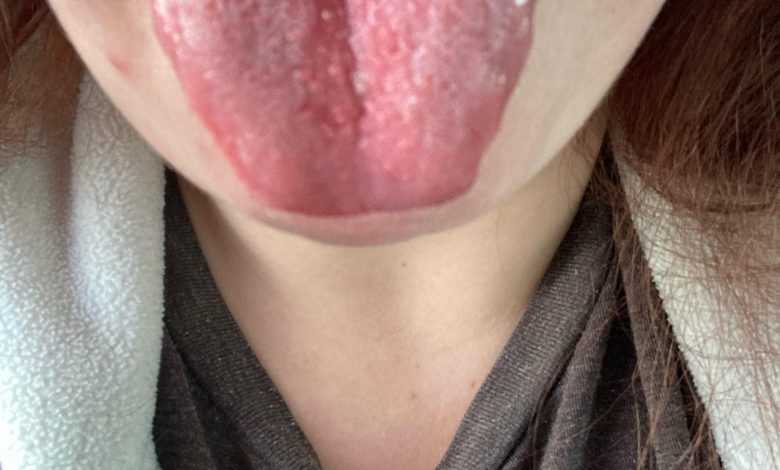Medications That Cause Burning Mouth Syndrome

Burning Mouth Syndrome (BMS) is a painful condition often described as a burning, scalding, or tingling feeling in the mouth that may occur every day for months or longer. A dry mouth or an altered taste in the mouth may accompany the pain. BMS often starts seemingly out of nowhere. It may feel like your tongue is being burned by a hot liquid like coffee.
People with BMS often report that the burning worsens throughout the day. Your mouth may feel OK when you wake up but develop a burning feeling later in the day. Once asleep, the pain may improve. The next day the cycle begins again.
A bitter or metallic taste often happens along with the burning feeling. Many people also feel a dry mouth despite having regular saliva flow. Sometimes, the burning is so severe that the chronic pain causes depression and anxiety.
Can Medications Cause Burning Mouth Syndrome?
Yes, the use of some types of medication can cause or trigger burning mouth syndrome. Some medications can cause BMS by directly irritating the mouth, altering taste, or causing dry mouth. If you’re experiencing BMS, it’s essential to review your medications with your healthcare provider to identify any possible medication-related triggers. In this article, we’ll discuss some medications that can cause BMS.
1. Blood pressure medications
Blood pressure medications, particularly ACE inhibitors and calcium channel blockers, have been associated with BMS. ACE inhibitors like lisinopril and enalapril are used to lower blood pressure by relaxing blood vessels. Calcium channel blockers, like amlodipine and nifedipine, work by dilating blood vessels, which lowers blood pressure. These medications have been shown to cause a dry mouth, which can lead to BMS.
2. Oral health medications
Some medications used to treat oral health issues can cause BMS. For example, toothpaste containing sodium lauryl sulfate (SLS) can cause irritation in the mouth and lead to BMS. SLS is a foaming agent commonly found in toothpaste, and it can cause a burning sensation in the mouth, especially for those who are sensitive to it. Mouthwashes containing alcohol or hydrogen peroxide can also cause BMS.
3. Antidepressants
Antidepressants like selective serotonin reuptake inhibitors (SSRIs) and tricyclic antidepressants (TCAs) have been associated with BMS. SSRIs, such as fluoxetine and sertraline, work by increasing serotonin levels in the brain, which can improve mood. TCAs like amitriptyline and nortriptyline work by altering levels of neurotransmitters in the brain. These medications can cause dry mouth, which can lead to BMS.
4. Allergy medications
Antihistamines are commonly used to treat allergies, but they can also cause BMS. These medications work by blocking the action of histamine, a chemical released during an allergic reaction. Antihistamines like diphenhydramine and cetirizine can cause a dry mouth, which can lead to BMS. Nasal decongestants like oxymetazoline can also cause BMS by irritating the lining of the mouth.
5. Diabetes medications
Diabetes medications like metformin and glimepiride have been associated with BMS. These medications are used to treat high blood sugar levels in people with diabetes. Metformin works by decreasing glucose production in the liver, while glimepiride increases insulin production. These medications can cause a metallic taste in the mouth, which can contribute to BMS.
6. Pain medications
Pain medications like opioids and nonsteroidal anti-inflammatory drugs (NSAIDs) have been associated with BMS. Opioids like oxycodone and hydrocodone are used to treat moderate to severe pain, while NSAIDs like ibuprofen and naproxen are used to treat mild to moderate pain. These medications can cause dry mouth, which can lead to BMS. Opioids can also alter taste perception, leading to a bitter or metallic taste in the mouth.
7. Chemotherapy medications
Chemotherapy medications can cause a variety of side effects, including BMS. Chemotherapy drugs like cisplatin and carboplatin can damage nerves in the mouth,
It is important to note that not everyone who takes these medications will develop BMS, and there may be other factors involved in the development of the condition. If you are experiencing symptoms of BMS, talk to your healthcare provider to determine the underlying cause and the best treatment plan for you.
How To Prevent Burning Mouth Syndrome (BMS)
There is no guaranteed way to prevent Burning Mouth Syndrome (BMS) since the exact cause of this condition is not fully understood. However, here are some tips that may help reduce the risk of developing BMS:
1. Avoid irritating foods and drinks: Spicy, acidic, and hot foods and drinks can irritate the oral tissues and trigger or worsen BMS symptoms. Avoiding these items may help reduce the risk of developing BMS or improve existing symptoms.
2. Practice good oral hygiene: Regular brushing and flossing can help maintain good oral health, reducing the risk of developing oral infections that can lead to BMS.
3. Manage stress: Stress can worsen BMS symptoms in some people. Practicing relaxation techniques, such as meditation, yoga, or deep breathing, may help manage stress and improve symptoms.
4. Avoid smoking and tobacco products: Tobacco use can damage oral tissues and increase the risk of developing BMS.
5. Stay hydrated: Drinking plenty of water and staying hydrated can help maintain good oral health and reduce the risk of developing BMS.
6. Manage underlying medical conditions: If you have an underlying medical condition, such as diabetes or hypothyroidism, managing it may reduce the risk of developing BMS.
If you are experiencing symptoms of BMS, it is important to see your healthcare provider to determine the underlying cause and the best treatment plan for you.





